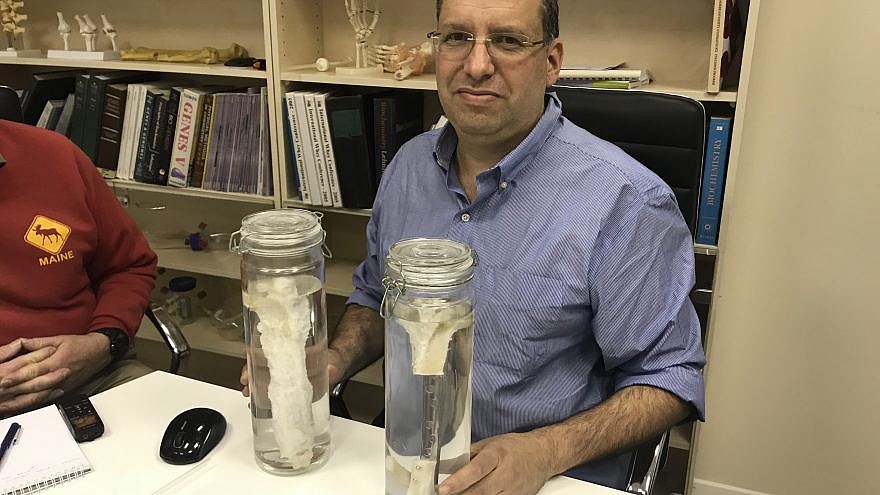In an unprecedented procedure, the Israel-based biotechnology company Bonus BioGroup has successfully injected a lab-grown bone into three patients in the last six months, and is planning on making 27 more of the injections for a clinical study during this coming year.
“We are making history,” proclaimed Prof. Nimrod Rozen, head of the orthopedic ward at HaEmek Hospital in the northern Israeli town of Afula, who performed the surgeries.
“The invention started here in Israel, in the ‘start-up nation,’” said Rozen, noting that Israel is full of “really good people to collaborate with, with strong minds and spirits, and great optimism, which is needed in this field.”
The bones grew in a bioreactor device that simulates the body’s environment, with the material sourced solely from each patient’s own fat cells.
“We can grow bones in any size, shape or structure from small samples of bone, fat or cartilage tissue to fit the patients’ needs,” said Dr. Shai Meretzki, CEO of Bonus BioGroup.
According to Rozen, the new bone is initially seven times stronger than the patient’s bones until they grow marrow four to six months after the bone is implanted. At that time, the new bone will be just as strong as a normal bone. “Patients can bear full weight immediately after the surgery,” said Rozen.
During the procedure, doctors removed fat cells from each of the patients, grew them in the lab and injected them back into the patients’ bodies. After just two weeks, the bone was injected back into the patients’ bodies to regrow the missing bone. Then, after six weeks, the bone regrew up to 10 centimeters (about 4 inches) long.
An American company performs a similar procedure, but is only capable of implants of up to one-centimeter (0.4 inch) long.
This groundbreaking new procedure could help patients with critical bone or cartilage loss, often due to car accidents, military trauma, infection, cleft palate, shrinking vertebrae, cancer amputations, labor accidents, osteoporosis or even dwarfism.
“For our short stature patients who are 140 centimeters (55 inches) tall, we can add 10 centimeters to their stature. If we do it twice, that’s 20 centimeters (8 inches), which is a total game-changer for the way they look at themselves, their self-confidence and how they act in society. It really changes everything,” said Rozen.
As breast augmentation is the most common surgery worldwide, Bonus BioGroup also envisions a market for growing fat tissues for lower-risk breast implants.
Unlike traditional surgery methods, this method completely heals bones, whereas traditional surgery straightens or reduces pain or symptoms of bone loss. It is also less invasive than traditional surgeries, decreases recovery time, and often removes the need for multiple surgeries and any chance of rejection after the procedure. This procedure will be “better, stronger, healthier, and cheaper than any existing solution,” said Meretzski.
Although surgery costs will depend on the bone size, Bonus BioGroup’s jaw procedure may cost around $10,000-15,000, compared to the traditional surgery cost of $80,000-100,000.
The innovation is in high demand abroad. According to Meretzski, the 10-year-old company has been approached by hospitals and countries from around the globe—even in Israel’s Arab neighbors—that want to make use of the technology. “After the company finishes two clinical studies of 50 patients in bone gaps and gets FDA approval, phase three will be multinational,” Meretzski said.
To date, $20 million has been invested in the technology, and Rozen envisions that this could significantly expand with international aid.
“Bonus will provide health to a lot of human beings suffering, and not just from point of view of the Western population,” he said, recalling a lecture he gave two months ago in South Africa. “People came to me from Rhodesia, Uganda and other African countries and asked if we can come to do mercy operations there for post-traumatic injuries from infected bones and tuberculosis on the bones. So our next step, after getting FDA approval, is to write to the United Nations asking them to support such initiatives to get them walking ad functioning again. It would be really good for my soul, and for them to function with an Israeli invention.”
“The future is so bright,” added Rozen. “In three years, we’ll have a prescription for when a patient needs a surgery and is missing bone due to trauma. By filling the bone gap, I’ll be able to fix the bone without losing the limb. In 15 years, we’ll be able to grow an entire hip without metal, screws or artificial materials. This is in the near future.”
Meretzski said, “We are the only ones capable of growing live bone identical to any bone in body and that is something to be proud of. Everyone loves the technology.”


























